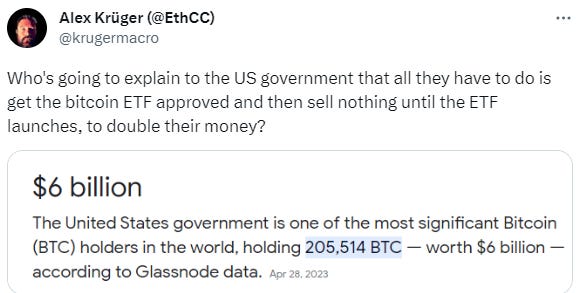Judge Gives Crypto a Win in Ripple Case
Weekly News Recap: 🚓 Mashinsky arrested, 🎉 FTX creditors get good news, 🧩 Multichain’s controversy, ⚖️ SEC fights Coinbase and critics, and more!
The enduring legal tussle between the SEC and Ripple has reached a significant turning point with a recent ruling.
Judge Torres' judgment that most XRP buyers weren't actually investing in Ripple but instead engaging in independent transactions has come as a monumental shift.
The battle isn't over, but the landscape has certainly changed. To decipher what this means for the crypto world, we are joined by Lewis Cohen, cofounder of DLx Law.
“What [Judge Torres] concluded was the people buying and selling the XRP tokens on the exchanges were not engaging in investment contract transactions with Ripple,” Lewis said.
Is this defining moment in the history of cryptocurrency regulation?
Weekly News Recap
Ex-Celsius CEO Is Arrested
On Thursday, Alex Mashinsky, the former CEO of the now-bankrupt crypto lender Celsius Network, was arrested and hit with a wave of lawsuits from various U.S. agencies. The Department of Justice (DOJ), the Securities and Exchange Commission (SEC), the Commodity Futures Trading Commission (CFTC), and the Federal Trade Commission (FTC) all filed charges against Mashinsky on the same day, and all but DOJ did so against Celsius.
The DOJ has accused Mashinsky and other Celsius officials of orchestrating a scheme to inflate the price of Celsius's proprietary token, CEL, and of misrepresenting the company as a "modern-day bank.” The SEC alleges that Celsius and Mashinsky misrepresented the company's business model and the risks to investors, while the CFTC claims that the company engaged in a scheme to defraud customers by misrepresenting the safety and profitability of its digital asset-based finance platform.
The FTC has reached a settlement with Celsius, banning the firm from handling consumers’ assets and blocking it from offering any product or service that could be used to deposit, exchange, invest, or withdraw any assets. The FTC also charged former executives Shlomi Daniel Leon, Hanoch “Nuke” Goldstein, and Mashinsky with tricking consumers into transferring crypto onto the platform.
Arkham's Intelligence Exchange Stirs Controversy
In a week that has seen its fair share of crypto drama, Arkham Intelligence's newly launched on-chain intelligence exchange took a turn at the center of the storm. The platform, which will allow users to trade information about the owners of any crypto wallet, has been met with widespread backlash, with critics labeling it a "dox-to-earn" model.
Arkham CEO Miguel Morel has been quick to defend the initiative, arguing that complete anonymity is not a fundamental feature of cryptocurrency and that what Arkham Intel Exchange enables is nothing new. Morel said in an Unchained Premium interview: "It is already the case that people are doing on-chain analysis to figure out who is behind what kinds of crime that can occur on chain potentially.” He emphasized that the exchange aims to disincentivize fraudulent behavior in the crypto space by encouraging transparency.
Despite the controversy, Morel remains committed to the project, promising to release more guidelines on moderation soon. To learn more about how it would work and Morel’s response to criticism, make sure to subscribe to Unchained Premium.
FTX Creditors Begin Path to Recovery
This week, bankrupt crypto exchange FTX initiated a refund process for creditors via a newly launched claims portal. The move follows the recovery of over $7 billion by the current FTX management. However, the portal's launch was not without hiccups, with some users reporting access issues due to high traffic volume.

In a separate development, former FTX executive Ryan Salame is under investigation by federal prosecutors for potential campaign finance violations. The allegations, unrelated to FTX's collapse, concern contributions to his girlfriend Michelle Bond’s congressional campaign last year. The investigation, which began in April, is being treated separately from the case against FTX founder Sam Bankman-Fried, who is due to face trial in October.
Moreover, FTX is seeking to reclaim $323 million from the executives of FTX Europe, including Patrick Gruhn, Robin Matzke, Brandon Williams, and Lorem Ipsum UG. Lawyers for FTX have accused these insiders, including former CEO Sam Bankman-Fried, of using misappropriated funds to acquire Swiss firm Digital Assets AG (DAAG), later renamed FTX Europe. The acquisition, allegedly conducted without due diligence, was reportedly motivated by the potential for regulatory access in the European Economic Area. The legal team is now requesting that further payments to the defendants be halted.
Was Multichain a Hack or a Rugpull?
In a week of turmoil for the cross-chain protocol Multichain, unauthorized outflows have raised suspicions of a possible internal 'rugpull,’ which is when developers who have raised funds for a project abandon it and fraudulently keep investor funds. The protocol, which facilitates the exchange of tokens across multiple blockchains, saw abnormal withdrawals amounting to over $125 million last week. This was followed by another $103 million in crypto being moved to various blockchain addresses, according to security firm Beosin.
Blockchain data firm Chainalysis suggests that the exploit could be an inside job, as the project administrator's keys were compromised. The disappearance of Multichain's CEO, known as Zhaojun, further fuels these suspicions.

In response to the exploit, stablecoin issuers Tether and Circle have immobilized over $65 million in assets linked to the hacker's addresses. The Fantom Foundation, the organization behind the Fantom network, identified three addresses associated with the exploit that Circle had blacklisted. These addresses held more than $65 million in assets, predominantly in USDC. Tether also immobilized $2.5 million in funds transferred from Multichain.
SEC Counters Coinbase's Claims in Ongoing Lawsuit
Last Friday, the SEC responded to Coinbase's motion to dismiss the regulator's lawsuit, asserting that the crypto exchange was aware that securities laws could be applicable to its business. Coinbase had argued that the SEC's action violated its due process rights and fell outside the regulator's jurisdiction. However, the SEC has countered that Coinbase had repeatedly informed shareholders that assets on its platform could be deemed securities. The SEC stated, "These actions clearly show that Coinbase understood that the securities laws could apply to its conduct... but nevertheless made the calculated decision to take on this risk in the name of growing its business."

On Thursday, during the first hearing of the legal dispute between Coinbase and the SEC, Judge Katherine Polka Faila questioned both parties on various topics, including the definition of staking and Coinbase's IPO filings.
The judge expressed skepticism about the SEC's stance, noting a "tension" between the regulator's claim that it was not seeking to regulate all crypto and its efforts to enforce alleged securities law violations. The SEC's counsel clarified that the agency regulates conduct, not all crypto. The status of Bitcoin and Ether was also discussed, with the SEC confirming that Bitcoin is not a security.
SEC and Crypto Firms Lock Horns Over Spot Bitcoin ETFs
On Monday, former SEC Chair Jay Clayton suggested that a spot Bitcoin ETF could be approved if institutions can prove its efficacy and efficiency. Additionally, Grayscale, a crypto asset manager, criticized the SEC for approving a riskier leveraged Bitcoin-based ETF while rejecting its own spot Bitcoin ETF application.
Despite this criticism, on Wednesday, SEC Chair Gary Gensler refuted the crypto industry's calls for his recusal from certain crypto-related decisions. He claimed he adhered to ethical responsibilities and legal compliance.
Meanwhile, Cboe confirmed a surveillance deal with Coinbase for some of the proposed ETFs, which caused the exchange’s stock to surge by up to 11% on Monday.
In a separate development, Grayscale and Fir Tree Capital Management have agreed to resolve a lawsuit filed by the latter last year. The hedge fund had sued Grayscale for information to investigate potential mismanagement and conflicts of interest. As part of the agreement, Grayscale will provide Fir Tree documentation about its flagship product GBTC.
DCG Calls Gemini's Lawsuit a Publicity Stunt
The Digital Currency Group (DCG) has called a lawsuit filed by Gemini a "publicity stunt" orchestrated by Gemini founder Cameron Winklevoss. Gemini, in its lawsuit, accused DCG and its CEO Barry Silbert of fraud against creditors and alleges that Silbert was the "architect and mastermind" of what it called the firm's "fraud" against creditors.
DCG, in its response, stated that Gemini's leadership was either missing in action or issuing press statements while DCG was actively working on a resolution plan. DCG stated: "To be clear, neither Cameron nor Tyler Winklevoss have been involved in any of the recent in-person meetings.”

Gemini is seeking to recoup over $1.12 billion from DCG's crypto lending subsidiary Genesis for users of the Gemini Earn program. The lawsuit follows a series of failed negotiations between DCG, Gemini, and creditor groups on a resolution plan for Genesis, which filed for Chapter 11 bankruptcy in January.
Prometheum Under Fire: Lawmakers Demand Investigation
U.S. Senator Tommy Tuberville and five fellow Republican lawmakers have called for an investigation into Prometheum, a firm that recently secured approval from FINRA to offer trading and custody of digital asset securities. The lawmakers allege that Prometheum may have provided false testimony to Congress or violated U.S. securities laws.
The controversy centers around Prometheum's relationship with Shanghai Wanxiang Blockchain, Inc., a Chinese firm with alleged ties to the Chinese Communist Party. The lawmakers have questioned why Prometheum continued to assert in SEC filings through 2020 and well into 2021 that it was continuing development efforts with Wanxiang, despite Prometheum co-CEO Aaron Kaplan stating to Congress that the company began developing its technology platform independently in December 2019.
Additionally, on Wednesday, The Blockchain Association requested an SEC internal investigation into the approval of Prometheum's special purpose broker-dealer license. Meanwhile, Forbes reported that New York Congressman Ritchie Torres is also pushing for investigations into Prometheum. Torres has questioned whether the SPBD license was a political move by the SEC rather than a genuine effort to integrate digital assets into existing regulatory frameworks.
US Government Moves $300 Million in Bitcoin
This week, the U.S. government moved approximately $300 million worth of Bitcoin, previously linked to the infamous Silk Road marketplace, across three separate transactions. The Bitcoin was held in wallets controlled by the U.S. Department of Justice (DOJ). This move comes after the DOJ sold 9,861 Bitcoin for $216 million in March, following the seizure of 50,000 Bitcoin linked to Silk Road in November. The recent transactions sparked speculation about another potential sale, although the DOJ has not confirmed this. The Bitcoin price experienced a minor dip following the transactions but has since recovered. The Silk Road-related Bitcoin transfers are closely watched due to their potential impact on the market.
Binance.US Quells Fears Over Bitcoin Cash Withdrawals
Binance.US has been battling market fears over its Bitcoin Cash (BCH) reserves. The company recently paused BCH withdrawals due to a technical issue in its deposit sweeping system, sparking concerns among users.
Some market participants pointed out that the withdrawal issues coincided with a surge in the price of BCH. However, Binance.US has assured its customers that it maintains a 1:1 reserve for every BCH held on the platform. The company stated: "Rest assured that your assets remain safe and secure, and no amount of FUD will ever change that." The BCH withdrawals have since been fully restored.

FUN BITS 😁
It’s time for Ginny from Unchained to tell you the story of Taylor Swift and FTX through her lyrics.
If you enjoyed this, don’t forget to follow Unchained on all social media platforms. Find the links below ⬇️
If You Like What You Read:
👯♀️ refer Unchained with a friend and earn a Premium subscription
👍 follow Laura on Twitter, Facebook, Instagram, TikTok, Mastodon and/or LinkedIn
🎧 subscribe to Unchained on YouTube, Apple Podcasts, Spotify, Google Podcasts, Pandora or wherever you get your podcasts
and/or 📚buy my book, The Cryptopians: Idealism, Greed, Lies, and the Making of the First Big Cryptocurrency Craze









